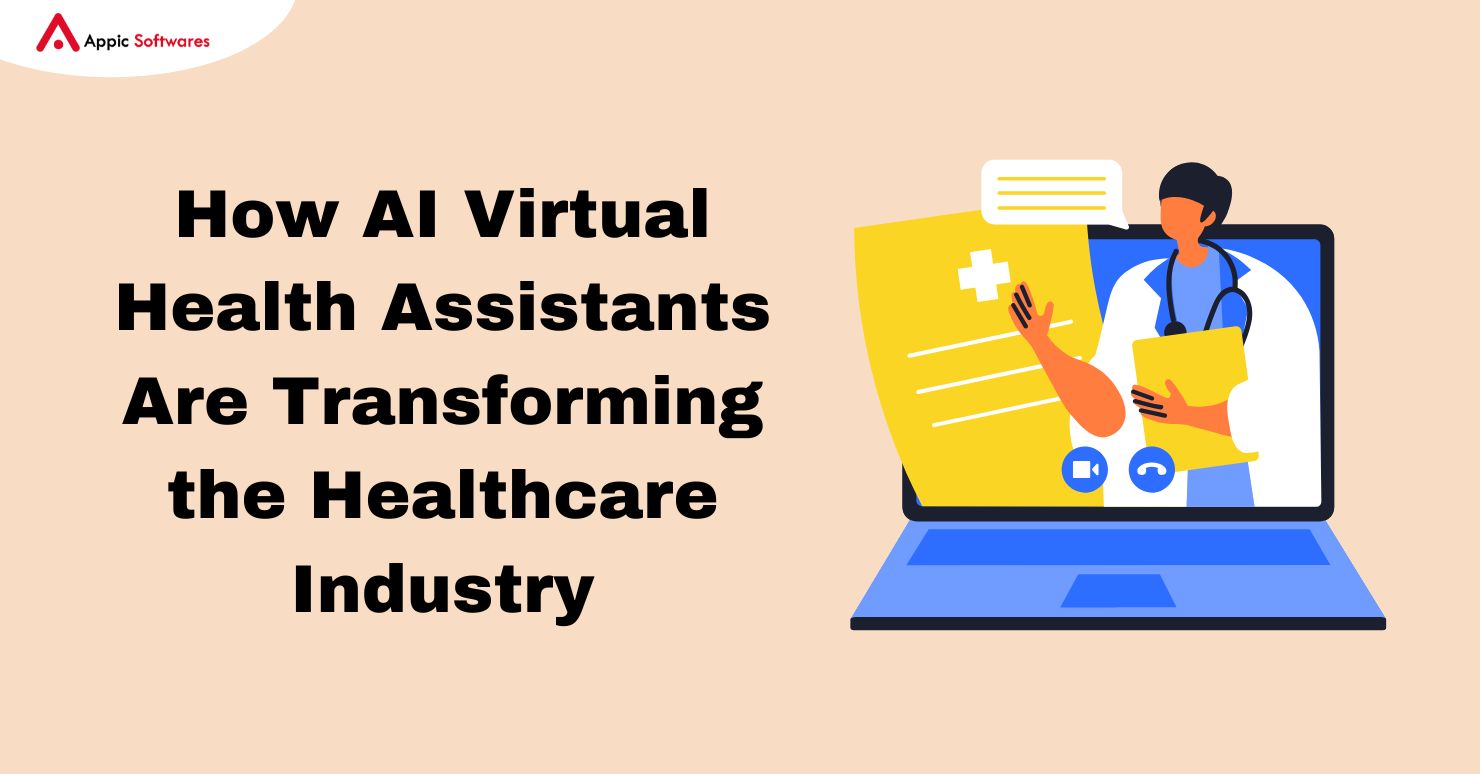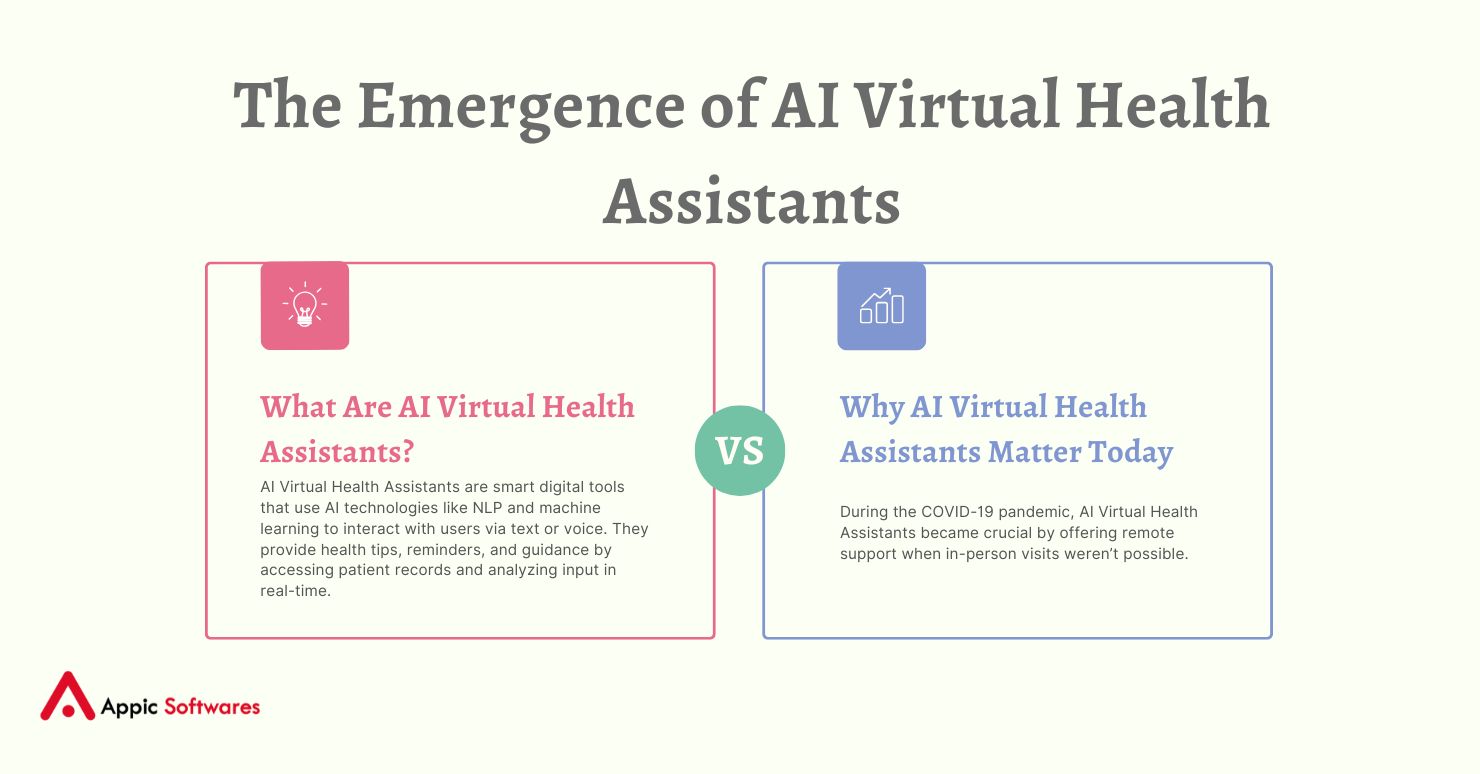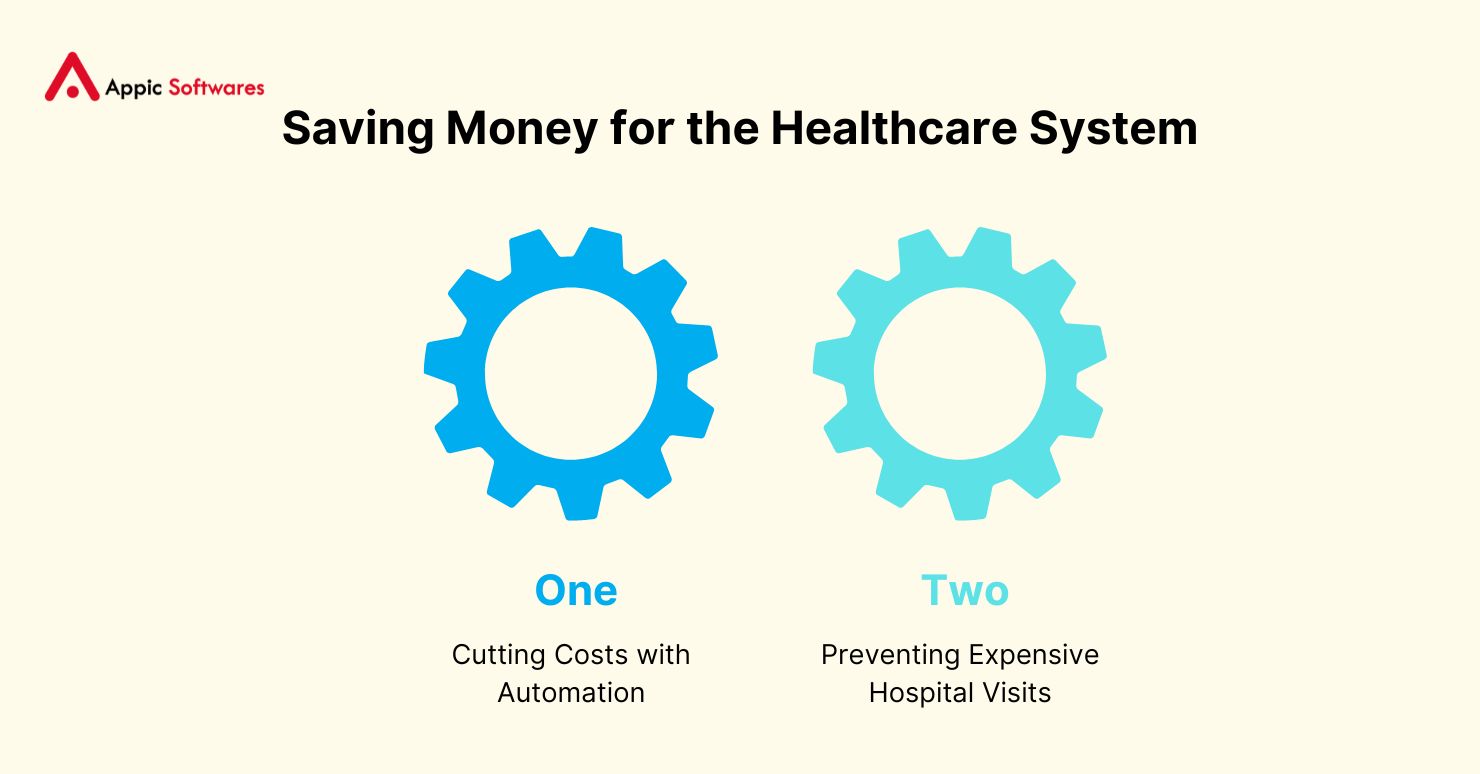
The healthcare industry is going through a major digital transformation. One of the most exciting and impactful innovations is the use of AI Virtual Health Assistants. These assistants use artificial intelligence to help both patients and healthcare providers. They offer support 24/7, answer health-related questions, book appointments, and even provide emotional and mental health guidance. With the help of a reliable AI development company, healthcare providers can build smart virtual assistants that streamline operations and deliver personalized care experiences.
The global market for AI in healthcare was worth $14.92 billion in 2024 and $21.66 billion in 2025. It is expected to grow at a strong CAGR of 38.6% from 2025 to 2030, reaching a value of $110.61 billion by the end of that year. Another survey found that 75% of healthcare providers are already using or planning to use virtual health assistants. This shows how vital these tools are becoming in the healthcare system.
In this article, we will explore in depth how virtual medical assistants, mental health virtual assistants, and other virtual assistants for healthcare are changing the way care is delivered. We will look at how they improve patient experience, reduce operational costs, support chronic care, and expand mental health services.
The Emergence of AI Virtual Health Assistants

What Are AI Virtual Health Assistants?
AI Virtual Health Assistants are not human, yet they mimic human communication. These digital tools use sophisticated AI technologies to interact with users via text or voice.
They can process questions, assess patient records, and offer medically relevant responses. These responses may include health tips, reminders, or suggestions to consult a doctor. All this happens through channels like mobile apps, websites, or integrated patient portals.
At the core of these assistants is Natural Language Processing (NLP). This allows them to interpret user input, whether it’s written or spoken. Combined with machine learning algorithms, the assistants continue to learn from each interaction and grow more accurate over time.
These systems also link with Electroni
c Health Records (EHRs), allowing them to deliver tailored information based on an individual’s history. Their ability to personalize makes them not just responsive but also context-aware.
If you’re building a solution like this, you must know how to integrate ai in healthcare effectively to achieve desired results.
Why AI Virtual Health Assistants Matter Today
When COVID-19 hit, many people couldn’t visit doctors in person. Hospitals were full. Clinics were closed. People needed help from home. That’s when virtual health assistants became essential.
These assistants made it possible to get quick answers. They helped with symptom checking.
Now, they are used every day in clinics, hospitals, and apps. They make healthcare faster, easier, and more personalized.
How AI Virtual Health Assistants Work
The Technology Behind AI Virtual Health Assistants
These assistants rely on advanced technologies. NLP helps them understand human language. Machine learning helps them get smarter. They also use data from medical databases and EHRs.
When a user types or speaks, the assistant analyzes the words. It finds the intent. Then it searches databases. It finds the best answer. Then it responds in a human-like way.
They are also connected to calendars, health trackers, and clinic systems. This lets them handle many tasks like reminders, booking, and follow-ups. This architecture aligns with the concept of goal based ai agents that perform tasks proactively based on user-defined health outcomes.
Examples in Real Life
Imagine a user asks, “What should I do for a sore throat?” The assistant checks the question. It may ask follow-up questions. It checks the patient’s health history. Then it suggests home remedies. Or it may say to contact a doctor.
This makes healthcare virtual assistants very helpful. They give useful, fast, and accurate advice. They do this at any time, day or night.
Improving Administrative Workflows
Cutting Down Admin Work
Healthcare workers spend a lot of time on paperwork. They fill out forms and book appointments. These tasks take time.
Virtual medical assistants can handle many of these jobs. Patients can use an app to book appointments. The assistant sends reminders. It collects information before a visit. This saves time and reduces human error, and also fits well within the broader context of building effective solutions for creating a healthcare software.
Better Workflow and Less Stress
With virtual assistants, healthcare staff can focus on care. They spend less time on the phone. They make fewer mistakes. The whole process becomes smoother.
This saves time. It also makes clinics more efficient. And it helps doctors spend more time with patients.
Making Patient Experience Better
24/7 Support Without Waiting
Imagine waking up at midnight with a health concern. A virtual health assistant is ready, regardless of the hour. It listens to concerns, provides advice, or directs the patient to the next step.
This 24/7 accessibility is more than a convenience. It’s a way to provide consistent, round-the-clock care. It reduces anxiety in patients and builds trust.
Many of these assistants can also switch between multiple languages. They can respond in simple, understandable terms, making healthcare more inclusive.
Personalized Care Like Never Before
A traditional system often forgets the patient once they leave the clinic. AI Virtual Health Assistants fill that gap. They can monitor conditions like asthma, hypertension, or diabetes and offer customized reminders or alerts.
If someone forgets to take medication or misses a reading, the assistant may prompt them. It may also help prepare patients for upcoming procedures or check in afterward to track recovery. This personalized care is driven by smarter types of ai agents that adapt based on patient behavior.
Helping Manage Chronic Diseases
Better Monitoring at Home
Patients with chronic conditions often feel overwhelmed. Managing medications, appointments, diet, and symptoms can be a daily challenge.
Virtual assistants simplify this. They log health metrics, guide patients through daily routines, and alert them when readings are off. A diabetic patient, for instance, may get notified to check their sugar levels at regular intervals.
Rapid Escalation When Needed
If a patient enters a concerning symptom, like chest pain or swelling, the assistant can flag the care team instantly. These early alerts help prevent hospitalizations and complications.
Patients remain safe at home while being closely monitored. Doctors can intervene when necessary, instead of waiting for emergencies. This mirrors advances seen in other sectors like ai in inventory management is a game changer, where predictive technology ensures timely interventions.
Supporting Mental Health
The Role of Mental Health Virtual Assistants
Mental health struggles are common but not al
ways spoken about. Many individuals hesitate to reach out to professionals. Others simply don’t have access to licensed therapists.
AI mental health assistants bridge this gap. They allow users to speak freely without fear of judgment. The assistant might offer breathing exercises, mood tracking tools, or even cognitive behavioral therapy (CBT) techniques.
The approach is supportive and therapeutic. It’s not a replacement for therapy but acts as a useful supplement.
Privacy and Access for All
Some people feel embarrassed to ask for help. Others live in places without mental health services. These assistants offer help anytime. They are always there.
If needed, they suggest talking to a real therapist. They connect people with professional help.
Bringing Care to Remote Areas
Helping Rural and Underserved Places
In some areas, hospitals are far. Doctors are few. Travel is hard. People avoid care.
Virtual medical assistants solve this. Patients can use a phone. They can ask questions and check symptoms. They can get guidance.
This brings care to people who need it most. This is especially impactful in emerging tech spaces such as proptech trends in the real estate industry and rural digitization.
Removing Language and Reading Barriers
Some people cannot read. Others speak different languages. Assistants use voice and pictures. They talk in many languages.
This makes health information easy to understand. It helps everyone access care.
Saving Money for the Healthcare System

Cutting Costs with Automation
Every missed appointment or unnecessary ER visit adds to healthcare costs. Administrative work and staff salaries form a significant part of the budget.
By automating repetitive tasks and ensuring patients stick to their care plans, AI Virtual Health Assistants help reduce these expenses. They’re cost-effective and available at scale.
Preventing Expensive Hospital Visits
When patients follow care plans, they stay healthier. Assistants help them remember to take medicine. They check if problems are getting worse.
This helps prevent hospital readmissions. That saves thousands of dollars per patient.
Keeping Data Safe and Legal
Protecting Health Information
Patient data is private. It must be protected. These assistants use strong encryption. They keep data safe.
Only approved users can see it. All actions are logged. For teams managing sensitive data, auth0 next js authentication guide provides a secure way to handle user access in compliance with modern security practices.
Following the Rules
Healthcare follows strict rules. In the U.S., systems must follow HIPAA. In Europe, they follow GDPR.
Virtual assistants for healthcare are built with these rules in mind. They pass audits. They keep patient trust.
What’s Coming Next?
Integration with Smart Devices
Wearables like Fitbits or smartwatches are already tracking heart rates and sleep. Soon, AI assistants will not only observe this data, but they’ll also act on it.
An unusual heart rhythm might prompt a virtual assistant to recommend rest or alert a provider. These connections create a holistic monitoring ecosystem.
Becoming More Conversational
Expect conversations with AI assistants to feel even more natural in the future. Emotional recognition will help them sense user mood. Responses will be empathetic, tailored, and even comforting.
Over time, these tools will resemble human companions. They’ll not just inform but care, guide, and support. Partnering with the right healthcare software development company can ensure these advanced features are seamlessly integrated, delivering a more human-centric and impactful digital healthcare experience.
Conclusion
AI virtual health assistants are no longer a novelty. They are a vital part of modern healthcare.
Their capabilities range from handling admin tasks to supporting mental health. They improve access in remote areas. They reduce healthcare costs and enhance patient outcomes.
AI-powered healthcare is no longer the future, it’s the present. Whether you’re a hospital, clinic, or health-tech startup, integrating virtual health assistants can drastically improve patient engagement, reduce costs, and streamline operations.
At Appic Softwares, we specialize in building intelligent, secure, and scalable healthcare solutions tailored to your unique needs. We’re here to help you every step of the way.
Let’s transform patient care together. Contact us today!
FAQs
Can they integrate with wearable devices and mobile health tools?
Many AI assistants already integrate with wearables like smartwatches and fitness trackers. This helps create a continuous loop of monitoring, feedback, and proactive health suggestions. To learn more about mobile health tools, you can explore this detailed guide on mHealth applications.
How do virtual assistants help reduce healthcare costs?
They automate administrative tasks, reduce missed appointments, encourage care plan adherence, and help manage chronic conditions—thereby preventing costly hospital visits and reducing overall system burden.
Is it possible to build a custom AI virtual health assistant for a clinic or hospital?
Absolutely. Many healthcare providers are now investing in custom solutions. If you’re planning to build one, you should read this Healthcare Software Development Guide for a comprehensive overview of the process, technologies, and best practices.
What does the future hold for AI Virtual Health Assistants?
The future involves deeper integration with smart devices, more emotionally intelligent conversations, and advanced personalization. These assistants will become more human-like, offering not just medical help but also emotional companionship.


